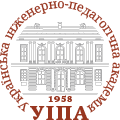Recently, a student of the Ukrainian Engineering Pedagogics Academy Vlasova Veronika gr. ДІТ-Ш21 and Ryabykh Anna gr. ДМП-М21-2млб have returned from a study visit to the University of Konstanz, Germany, which took place within the framework of the ERASMUS+ PAGOSTE project. And today we are making news in a slightly unusual format for us – in the format of impressions directly from the students themselves:
«Hello! Today we want to share the unforgettable impressions of our educational visit to the University of Konstanz in Germany. Our team consisted of 8 students of higher education institutions of Ukraine and a curator, Ms. Oksana Melnyk, a research associate at the Department of Business and Economic Education of the Universität Konstanz, who guided us and helped us during the two weeks.
The main task of the visit was to analyze the educational system in Germany, identify strengths and weaknesses, learn from the experience of foreign lecturers in order to find solutions for improving our Ukrainian educational system.
During the business trip, we had to make and share in the form of a presentation a number of reforms to improve education in Ukraine. We worked in small teams of two people (the partner was chosen randomly). There were only four such teams, but each of them had their own original thoughts and ideas.
The city in which we stayed fascinates with its beauty. Konstanz is located on the banks of the great Lake Constance and has a border with Switzerland. On the weekend, we went on a city tour and didn't even notice how we ended up abroad. All because Switzerland does not have a border with Germany, so you can understand that you are in another country only by the inscriptions and prices in francs. The water in the lake was so clear that you could see small fish on the bottom.
The size of the university is simply amazing. The area of the university occupies 90,000 m2. That is why it is very easy to get lost when changing auditoriums and buildings. During the two-week visit, we only started to navigate the map a little. The institution is equipped with a large library, which occupies one of the buildings with the letter «B». There are more than two million different books in the library, there are rooms for working in groups, for individual work, and relaxation areas.
There is also a large dining room, the windows of which overlook the lake and the small village of Egg. The university takes great care of its students and employees. The food in this canteen is of high quality, tasty and passes all levels of inspection. I would also like to note that Germany cares a lot about the environment, so you can see trash cans for sorting in the corridors of the university. When buying any drink, you will receive a plastic cup that can be used multiple times and handed over to a special machine in case of loss.
Each building of the university has its own letter of the English alphabet, which helps to find the necessary room faster. In one of the buildings there is a small museum where you can look at various insects, lizards or stuffed animals. We think this is a great option to relax or wait out the gaps between lectures.
Quizzes and various charity fairs are often held in the main building named «A». Usually, after a hard day's work, students gather there to play the piano, we think it’s a great way to relax and recharge for the next working day.
Almost every auditorium is equipped with modern technology, which allows teachers to present their subject to students at their best. One of the most interesting tasks of the study visit was attending five lectures in order to deepen my own research and look at the example of how lectures are conducted in Germany.
From our own experience, we can say that classes are held in a more relaxing manner, but they are more productive. Less information is given in lectures, examples of application of acquired knowledge are given. Even at lectures, work in groups, work in pairs, and individual work are used. It is not only interesting, but also helps to socialize. In this way, you get to know each other better, communicate, and this is very important in modern life.
In addition to attending lectures, we held mandatory meetings every day, where we immersed ourselves in the German educational system, studied its features and differences from the Ukrainian education we got used to; there we analyzed and identified positive and negative sides. I would like to note that we had not only formal meetings, we also had several joint dinners with teachers, where we could talk on free topics, thus we got to know each other better.
Our rich educational and cultural program was implemented within the framework of the implementation by the Ukrainian Engineering Pedagogical Academy of the Erasmus+ project PAGOSTE (609536-EPP-1-2019-1-DE-EPPKA2-CBHE-SP) «New management mechanisms based on partnership and standardization of training professional education teachers in Ukraine». This educational visit was for us, students of UEPA, KNEU named after V. Hetman, NTU and PUNPU named after Ushinskyi, a real widening horizons in preparing us as future professionals and professional education lecturers.
Conducted research made it possible to analyze why European specialists are more qualified in the modern world and are interested in their professional activities. Of course, we practised our knowledge of English well, and some of us also learned German. Now we are very motivated to change our Ukrainian education system for the better, and we will succeed!»




